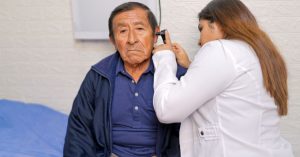Most people understand that staying hydrated is essential for their overall health—helping everything from energy levels to digestion and even brain function. But one area that often gets overlooked in the conversation about hydration is hearing. Surprisingly, your ability to hear clearly can also be affected by how much water you consume.
So, can dehydration affect hearing? The answer, as it turns out, is yes—at least indirectly. Your ears rely on a delicate balance of fluids to function properly, especially within the inner ear, where both hearing and balance are controlled. When your body doesn’t have enough fluids, it can lead to a range of hearing-related symptoms, from muffled sounds and tinnitus to vertigo and balance issues.
In this article, we’ll explore the relationship between dehydration and hearing health. We’ll dive into how the ear works, why fluid balance is so crucial, and who’s most at risk for hydration-related hearing issues. We’ll also provide helpful tips to maintain hydration, especially for older adults who are more susceptible to both dehydration and hearing loss. Whether you’re managing your own hearing health or caring for a loved one, understanding this connection could be a small but powerful way to support better auditory function.
Understanding Dehydration: More Than Just Thirst
Dehydration occurs when your body loses more fluids than it takes in, and it doesn’t take extreme heat or exercise for it to happen. For many older adults, dehydration can result from something as simple as not feeling thirsty, certain medications, or underlying health conditions that affect fluid retention and regulation.
Water plays a critical role in nearly every system in your body. It helps regulate temperature, supports digestion, keeps joints lubricated, and ensures that vital organs—like the heart and brain—function smoothly. But water is also essential for circulatory and neurological processes, both of which are deeply intertwined with your hearing ability.
When you become dehydrated, your blood volume decreases, which in turn can reduce oxygen flow to the inner ear. This is significant because the cochlea, a spiral-shaped part of the inner ear responsible for translating sound vibrations into nerve signals, is highly sensitive to changes in blood and fluid supply. A lack of adequate hydration can impair the cochlea’s function, leading to hearing difficulties or strange sensations like fullness in the ears.
Additionally, dehydration can disrupt electrolyte balance, especially sodium and potassium levels, which are vital for nerve signal transmission. Since hearing relies on precise electrical signals traveling from the ear to the brain, any imbalance can interfere with how sounds are interpreted.
It’s also worth noting that some common signs of dehydration—such as dizziness, confusion, headaches, or dry mouth—can mask or amplify other hearing-related symptoms, making it harder to recognize the real cause. This is especially concerning for seniors, who may already be managing multiple health conditions.
In essence, dehydration is not just a matter of feeling thirsty. It’s a systemic issue that can influence everything from how you move to how you hear. And while it’s not the first thing people associate with hearing loss, it may be a hidden factor worth paying closer attention to.
The Inner Ear: A Delicate Fluid Balance
To understand how dehydration can impact hearing, it’s essential to look at the intricate design of the inner ear. Unlike other parts of the body, the inner ear contains fluid-filled chambers that are vital for both hearing and balance. These fluids—endolymph and perilymph—play a key role in how sound is transmitted and how we maintain our sense of orientation.
The cochlea, which is responsible for detecting sound, is filled with these special fluids that help move tiny hair cells in response to sound waves. These movements are then converted into electrical signals sent to the brain. Even small changes in fluid levels or pressure within the cochlea can affect how well these signals are transmitted, leading to problems such as muffled hearing, ringing in the ears (tinnitus), or even temporary hearing loss.
Next to the cochlea is the vestibular system, which helps control balance and spatial orientation. This system also depends heavily on the proper volume and composition of inner ear fluids. When hydration levels drop, the fluid balance can be thrown off, leading to symptoms like dizziness, vertigo, or a sensation of ear fullness—all of which can be unsettling and sometimes mistaken for other medical issues.
The inner ear does not easily regenerate once damaged. That’s why maintaining proper fluid levels is so critical. Dehydration doesn’t necessarily cause permanent hearing loss, but it can trigger temporary hearing disruptions or aggravate pre-existing auditory conditions. Recurrent or chronic dehydration may, over time, increase vulnerability to long-term hearing damage by reducing the resiliency of these delicate structures.
It’s also worth noting that the inner ear’s fluid system is tightly regulated and self-contained. It doesn’t fluctuate dramatically under normal circumstances, but dehydration—especially when combined with other health factors like high blood pressure or diabetes—can cause shifts in pressure or composition, further straining the system.
In short, the inner ear is a small but complex environment that depends on precise hydration and chemical balance. Disruptions caused by dehydration can be enough to throw it out of sync, leading to noticeable hearing and balance issues.
How Dehydration Can Impact Hearing Health
Now that we understand how the inner ear relies on fluid balance, it’s easier to see how dehydration can lead to hearing issues. Though dehydration doesn’t typically cause permanent hearing loss, it can trigger a range of temporary auditory symptoms and even worsen existing conditions—especially in vulnerable populations.
One of the most common dehydration-related symptoms is temporary hearing loss. When the body is low on fluids, blood circulation is reduced, including to the tiny vessels that nourish the cochlea. This can impair the function of the hair cells inside the cochlea, making it harder for sound vibrations to be converted into electrical signals. The result? Sounds may seem muffled or distant, and hearing clarity can be noticeably reduced.
Another symptom linked to dehydration is tinnitus, or ringing in the ears. Tinnitus often results from disruptions in the auditory system, and dehydration-induced changes in electrolyte balance can interfere with how nerves transmit signals between the ear and brain. If you’ve ever felt your ears ringing after feeling overheated or lightheaded, dehydration may have played a role.
Balance issues are also a frequent companion to dehydration. The inner ear doesn’t just help us hear—it’s also responsible for spatial orientation and equilibrium. When the endolymph and perilymph fluids in the vestibular system become imbalanced due to low hydration, symptoms like vertigo, dizziness, and unsteadiness can occur. This is particularly concerning for older adults, who may be at greater risk of falls and injury.
Some case reports and anecdotal evidence even suggest that profound dehydration, such as what occurs during illness or extreme heat exposure, can lead to more severe hearing disruptions. While more research is needed to establish a direct cause-and-effect relationship, these observations underline the importance of fluid balance for ear health.
Additionally, medications used during dehydration-related illnesses—like diuretics or high doses of aspirin—can themselves be ototoxic, meaning they can damage hearing structures. This makes it even more important to stay hydrated and consult a healthcare provider when managing both hearing symptoms and systemic illnesses.
In summary, while dehydration may not directly “cause” hearing loss in the traditional sense, it can certainly affect how well we hear and maintain balance. These changes are often subtle and reversible with proper hydration, but they’re a reminder that even something as simple as drinking enough water plays a role in protecting your ears.
Who’s Most at Risk: Older Adults and Hearing Sensitivity
While anyone can experience the effects of dehydration on hearing, older adults are particularly vulnerable. This is due to a combination of age-related physiological changes, underlying health conditions, and the increased likelihood of taking medications that affect fluid balance.
As we age, our sense of thirst becomes less acute. Many older adults simply don’t feel thirsty as often, even when their bodies need fluids. This natural decline in thirst perception makes seniors more prone to chronic, low-level dehydration. Over time, this subtle lack of hydration can influence a wide range of bodily functions—including hearing.
Older adults are also more likely to be dealing with circulatory issues, such as high blood pressure, heart disease, or diabetes. These conditions can impair blood flow to the inner ear, and when combined with dehydration, the effects may be compounded. Reduced blood circulation means less oxygen and fewer nutrients reach the sensitive structures of the cochlea and vestibular system, increasing the likelihood of hearing disturbances.
Medications commonly prescribed to seniors can also play a role. Diuretics, often used to treat hypertension or heart failure, promote fluid loss and can easily tip someone into dehydration if fluids aren’t replenished. Some medications may also be ototoxic, meaning they can harm the auditory system directly. When dehydration is present, it may amplify the ototoxic effects, making hearing complications more likely.
Another factor to consider is that many seniors already live with some degree of hearing loss. Dehydration can make it harder to distinguish speech, amplify background noise, or cause ringing in the ears—all of which can exacerbate the challenges they already face in social and daily interactions. This can lead to further isolation, frustration, or even cognitive strain.
Caregivers should also be alert to signs of dehydration in the elderly, which can include dry mouth, confusion, dizziness, decreased urination, or sudden changes in hearing or balance. In care facilities or during hospital stays, monitoring fluid intake becomes even more crucial, especially when patients are ill or taking multiple medications.
In short, while hydration is important for everyone, it becomes a critical component of hearing health in older adults. Ensuring that seniors are drinking enough water and maintaining proper fluid balance could help reduce the occurrence of temporary hearing issues and support better overall ear health.
Preventing Dehydration for Better Hearing
The good news is that staying properly hydrated is one of the simplest and most effective ways to support your hearing health—especially if you’re over 50 or caring for someone who is. By keeping your body’s fluid levels balanced, you help ensure that the inner ear’s delicate systems function as they should, reducing the risk of hearing-related symptoms like tinnitus, dizziness, or temporary hearing loss.
Daily Hydration Goals
While hydration needs vary depending on body size, climate, and activity level, a general guideline for older adults is to aim for around 6 to 8 cups (1.5 to 2 liters) of fluid per day. Water is ideal, but herbal teas, low-sugar fruit juices, broths, and even water-rich fruits and vegetables (like cucumbers, watermelon, and oranges) contribute to overall fluid intake. Be cautious with caffeine and alcohol, as they can have a mild diuretic effect.
Recognizing Early Signs of Dehydration
Learning to spot early dehydration symptoms is key. Watch for:
- Dry mouth or lips
- Dark yellow urine
- Fatigue or light-headedness
- Headaches
- Changes in hearing or balance
In older adults, confusion or irritability can also be early warning signs, and any sudden changes in hearing clarity or stability should prompt both hydration and a conversation with a healthcare provider.
Hydration Tips for Older Adults
- Keep water accessible at all times—use a water bottle with a straw or spout for convenience.
- Set reminders using alarms or smartphone apps to drink water throughout the day.
- Make hydration enjoyable by infusing water with slices of lemon, mint, or berries.
- Use visual cues like tracking fluid intake on a daily chart.
- Adjust fluid intake in response to medication changes, hot weather, or illness.
For those with mobility issues or who rely on caregivers, it’s essential that caregivers prioritize fluid monitoring and offer drinks regularly—not just when someone feels thirsty.
When to Seek Medical Advice
If you or someone you care for experiences sudden hearing loss, persistent tinnitus, or balance issues, especially alongside signs of dehydration, consult a healthcare professional. While rehydration can often resolve symptoms, it’s important to rule out other underlying causes.
Ultimately, keeping your body well-hydrated isn’t just about avoiding dry skin or fatigue—it’s a key component of maintaining healthy ears. A simple commitment to daily hydration can contribute to clearer hearing, steadier balance, and improved overall well-being.
Conclusion
Hearing health is influenced by more than just age or noise exposure—it’s closely tied to overall well-being, including something as fundamental as hydration. Though it might seem surprising, dehydration can have a noticeable impact on how well you hear, how clearly you perceive sounds, and how steady you feel on your feet.
The inner ear’s reliance on fluid balance means that even mild dehydration can disrupt its function, leading to symptoms like temporary hearing loss, tinnitus, dizziness, and more. For older adults—who are already at increased risk of both dehydration and hearing difficulties—this connection is particularly important. Medications, health conditions, and natural changes in thirst perception can all contribute to a state of underhydration that quietly undermines ear health.
Fortunately, the solution is simple: drink more fluids regularly and pay attention to early signs of dehydration. Whether it’s through water, hydrating foods, or mindful caregiving, maintaining proper hydration can support not just your ears, but your energy levels, focus, and overall health.
So, the next time you find yourself asking, “Can dehydration affect hearing?”—you’ll know the answer is yes. And now you know just what to do about it.
FAQ
Can dehydration cause permanent hearing loss?
Typically, dehydration leads to temporary hearing issues rather than permanent loss. However, if dehydration is severe or frequent, it may aggravate existing conditions or make the ear more vulnerable to long-term damage, especially in older adults.
Why does dehydration cause ringing in the ears (tinnitus)?
Dehydration can disrupt the balance of electrolytes and reduce blood flow to the inner ear, both of which may affect how nerves function. This disturbance can trigger tinnitus or make existing ringing in the ears more noticeable.
Is dizziness from dehydration related to the ears?
Yes. The vestibular system in the inner ear, which helps control balance, relies on fluid to function properly. Dehydration can alter the fluid levels or pressure, leading to dizziness or a sense of imbalance.
How much water should I drink each day to support hearing health?
Most adults should aim for 6 to 8 cups (1.5 to 2 liters) of fluids daily, though this may vary based on individual health, medications, and activity level. Older adults may need reminders or support to ensure they stay consistently hydrated.
Can certain medications increase the risk of dehydration-related hearing issues?
Yes. Medications like diuretics and some pain relievers can lead to dehydration or have ototoxic effects, especially when fluid intake is low. Always consult a healthcare provider if you notice changes in hearing while taking new medications.
This article is for informational purposes only and is not a substitute for professional medical advice, diagnosis, or treatment. If you are concerned about your hearing or ear health, please consult a qualified healthcare provider.





